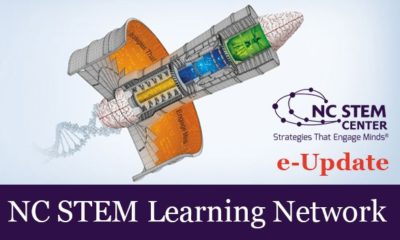In case you missed it, EdNC launched its EdData Dashboard last week. The culmination of six weeks of planing, research, and design.
The end goal? To centrally locate important data in a visually pleasing and user-friendly design.
But aesthetics and functionally are secondary to–and in service of–the most important function of the dashboard: sharing and interaction.
Each interactive data module includes a link to the data source, if you want to dig deeper, as well as a share option that allows you to embed charts, graphs, and maps into your own website, to share with your network via social, media, or email to colleagues.
The goal is to encourage users to start digging, to find data related to their specific communities or school districts. To that end, we have included an interactive county map that lets you more easily access the American Fact Finder page for each of the state’s 100 counties.
In Depth Data (e.g., Population, Income, Education) for NC Counties
Interested in the levels of educational attainment in the state and want to share it in a presentation or a blog? It’s easy to share or embed.
Educational Attainment of NC Population 25 Years and Older, 2014
We hope the data we include will paint a fuller picture of what affects learning in the state’s classrooms and how life outside the classroom can impede or enhance a child’s ability to learn. So in addition to more traditional measures of education funding and performance, we have included social and economic data as well.
NC Households with Children Receiving Public Assistance, 2014
Our work adds to the already impressive education data resources available in the state, including the Public School Forum of North Carolina’s Local School Finance Study, BEST-NC’s annual Facts & Figures publication, the University of North Carolina’s Educator Quality Dashboard, and many others.
But all this comes with a slight word of caution: Data isn’t everything.
Data is mostly reactive. It helps us understand where we’ve been and what we’ve done, and it shows us where we might be going if we maintain the status quo. It provides the foundation for our proactive, forward-looking decisions.
But data is a means to an end. A critical means, no doubt, but a means none the less. Data cannot name what we value as a society. It cannot tell us how we allocate resources for the next generation.
It is one leg in a three-legged stool. As EdNC columnist Ferrel Guillory likes to remind us, “Data without analysis is junk.” To paint a picture of where we’ve been, where we are, and where we hope to go, data must be informed by analysis, and analysis by data. And both should be framed by the very human need for story telling, the third leg in the stool that forms the foundation of our knowledge.
It’s easy to forget that behind every dot on the scatter chart or every bar in the graph, there is a very real life being lived. A life that does not exist merely in a regression analysis or a trend projection.
In his book, The Vanishing Neighbor, author Marc Dunkleman notes that in post-war academia, social scientists “…veered away from the mushier, more speculative stuff of earlier eras and toward the more numerically driven research that was more typical of the harder sciences.”
That was a good thing, of course. It acts as a check against opinion driven research and authenticates researchers’ hypotheses and sets a framework for verification. It adds quantitative weight to a researcher’s findings and assertions, measures that can independently be reproduced and verified for accuracy.
Dunkleman points out that the turn toward a more data-driven analysis of social interactions has resulted in the explosion of more popular, general social science writing, setting the stage for the rise of the Freakonomics series and popular thinkers like Nate Silver.
But Dunkleman notes that this trend toward quantification of our social lives has been at the expense of the more nuanced and immeasurable phenomena of our day-to-day interactions with each other.
“There are, after all, aspects of our lives that allude rigorous data analysis,” writes Dunkleman. “There’s no way to measure numerically how Americans balance the divergent impulses toward inter-directedness and other-directedness, or whether they are more or less driven to conform to the expectations of each varied social environment.”
Dunkleman isn’t saying we should abandon our new standard of data-driven analysis, but in this new way of doing business we should not “…let ourselves be trapped by the limits of quantifiable evidence.”
So, yes, data is vitally important to our conversations around education policy in this state, but it is only one option in our tool kit for decision making.
The convergence of data, analysis, and story telling is at the heart of our work at EdNC. All three set the stage for the vital discussion we have as a community about what it is we value and what we want to pass on to the next generation in this state. All three create the space for a conversation about education and what decisions we make in the here and how that will affect the lives of our children, their children, and their children’s children.
Data is a basis for a healthy democratic conversation. It is the starting point for a discussion that inherently involves conflict and disagreement, but which might lead to shared commonality, consensus, and decision making.
In his groundbreaking work After Virtue, the esteemed contemporary philosopher Alasdair MacIntyre critically examined the post-Enlightenment’s empowerment of the individual as a soverign moral agent. MacIntyre, channeling Aristotle, argued that morality is inherently a community-making activity. That through practice and formation, we begin to understand what morality might look like and how virtues might be properly understood and conveyed. For MacIntyre, morality cannot be cut off from the lives of others or be formed in personal isolation, disconnected from the larger community of which one is a member.
In other words, community defines values.
How do we as a state name what we value in education policy? How do we come to agreement on the best allocation of our resources? How do we reach consensus in governance?
It cannot be done in isolation. It cannot be answered by data alone. It requires conversation. It requires an understanding of and respect for the values of others. Data, analysis, and storytelling can inform the conversation, but they alone will not answer the questions we are asking.
Let’s start talking about what we value. What we want to leave to the next generation of this state. Because in the words of the 20th-century theologian Dietrich Bonhoeffer:
“The ultimate test of a moral society is the kind of world that it leaves to its children.”



